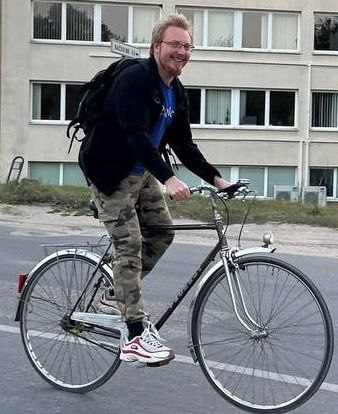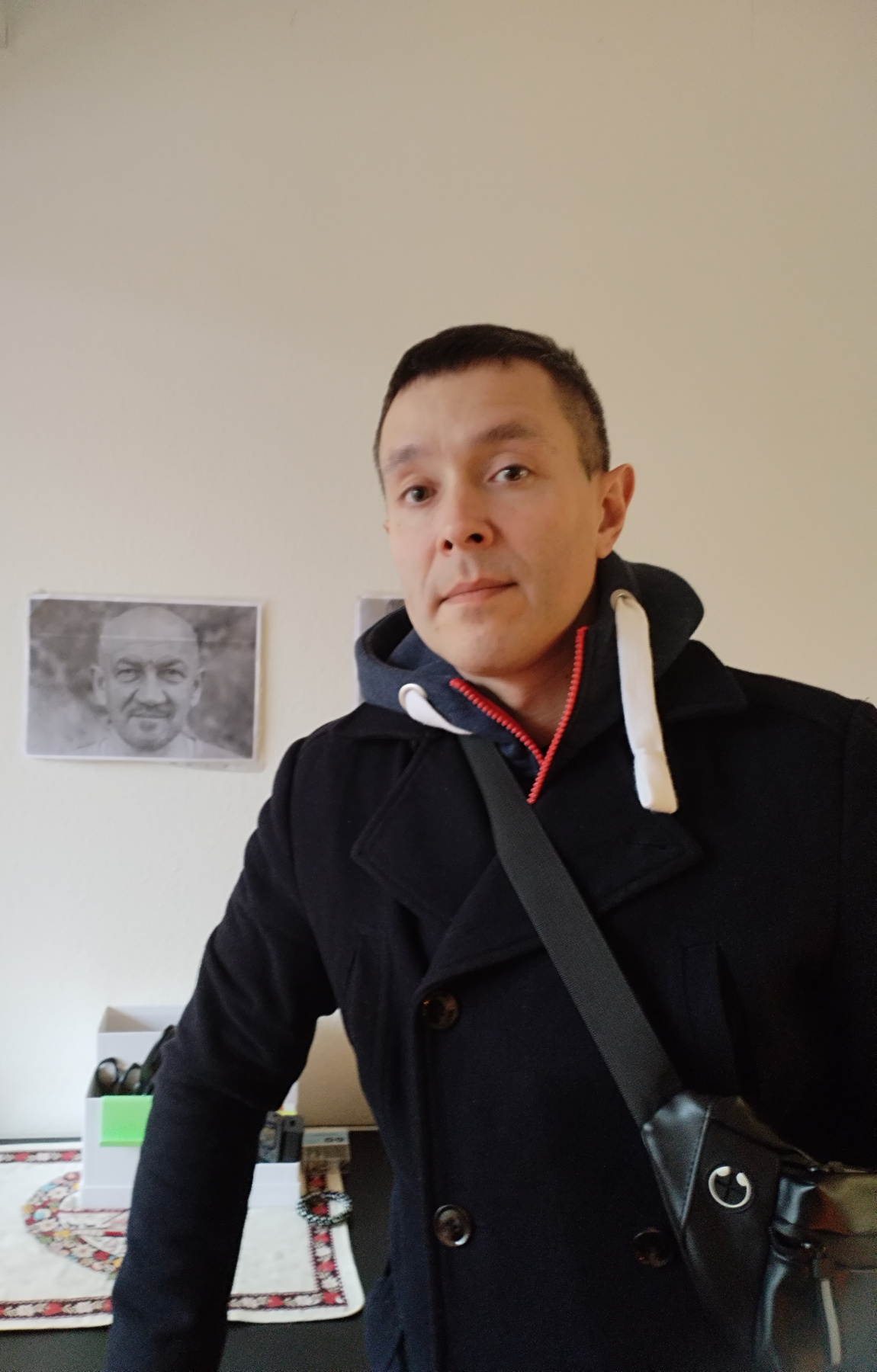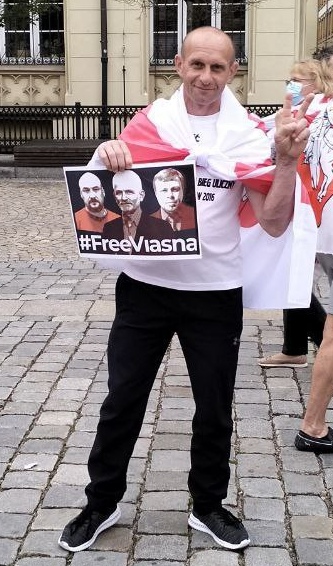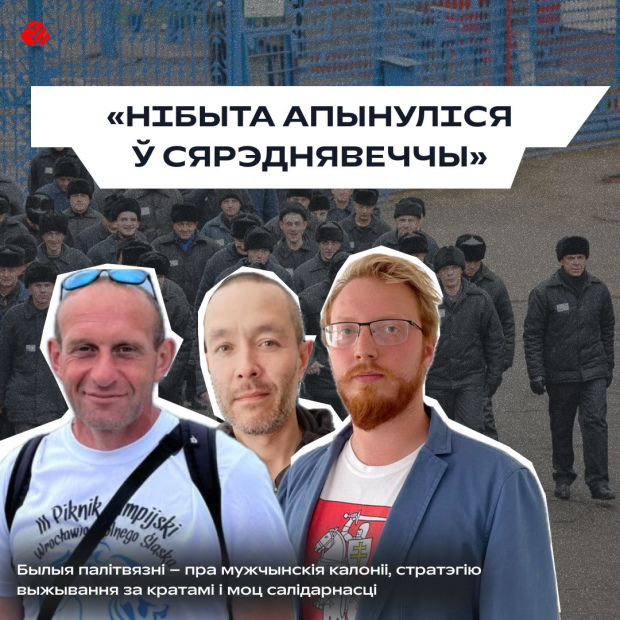Former political prisoners talk about male colonies, survival strategies behind bars, and the power of solidarity.
"The hardest thing about being in prison is the physical torture and restrictions on literally everything," says former political prisoner Anatoly Khinevich. Anatoly, 31, is a programmer and bard from Borisov. In 2020, the guy was sentenced to two and a half years in prison for allegedly resisting riot police. The former political prisoner was accused of "hitting riot police officers while lying down" during a protest.

Anatoly Khinevich served his sentence in penal colony No. 3 "Vitba". Having served his entire sentence, he left Belarus shortly after his release. Now the former political prisoner and his mother Oksana (who was detained by the KGB in January 2024 as part of a mass raid on relatives of political prisoners) live in Lithuania.
– When you are in a punishment cell, you are constantly shaking from the cold, it is impossible to sleep. The first three days I did not sleep at all, and on the fourth I would not say that it was a sleep, most likely I just lost consciousness for several hours. These tortures were the hardest, – Anatoly shares his memories. – Also, at first, when I worked dismantling metal, I lacked physical strength. I worked with difficulty: my health condition did not allow it. It got to the point that even my fingers on my hand went numb, I could not feel them.
– The situation with medicine was catastrophic, – former political prisoner Alexey Golovkin shares his memories. 38-year-old Alexey is an IT specialist from Grodno, has been disabled since childhood, suffers from hemophilia.
In 2021, the guy was sentenced to three years in prison for protest comments on the Internet. Alexey Golovkin was charged under four articles of the Criminal Code: "Violence or threat of violence against an employee of the internal affairs", "Insulting a government official", "Violence or threat against an official performing official duties" and "Coercion". Among those allegedly harmed by Alexey's comments are former Interior Ministers Shunevich and Karayev.

The former political prisoner served his sentence in penal colony No. 2 in Bobruisk. While behind bars, a new criminal case was opened against him – for the same episodes. After his release in August 2023, Alexey Golovkin left Belarus and now lives in Switzerland, where he received political refugee status.
– In the colony, the medical care was worse than in the pretrial detention center. If in the pretrial detention center the doctor came to me quickly enough and immediately gave me an injection, then in the colony I came to the medical unit, said that I felt bad, but they did not help me. I could not prove that I had started internal bleeding, at first this process is not visible, I only feel it. Over so many years, I have learned to recognize it unmistakably.
And only after some time, when my leg began to swell and turn green, I was given an injection – VIII antihemophilic factor. Although I had all the medical certificates about my health, all the instructions on how and when I needed to be injected, the prison doctors ignored it. A couple of months before my release, the doctor in the colony told me that my medications had run out, and that I would be treated at home. That is, for the last two months I have been sitting without injections, – says Alexey Golovkin.
Gennady Smirnov is a 49-year-old single father and farmer from Lyakhovichi. In 2021, he was sentenced to two and a half years of imprisonment in a high-security prison. The political prisoner was accused of resisting a police officer and insulting Lukashenko. The man's son, Vyacheslav, was also convicted of posting leaflets. The guy served 2.6 years in the so-called chemistry in Minsk: he was convicted under the article "insulting the president".
Gennady Smirnov served his sentence in penal colony No. 17 in Shklov. He was released in December 2023 and soon left Belarus with his son. The Smirnovs now live in Poland.

In the colony, Gennady spent more than 200 days in a punishment cell and a cell-type room:
– When morning and evening checks were held in these cells, I refused to greet the colony bosses and read the report. I introduced myself and told the jailers that I was unlawfully convicted. The head of the colony Korneenko and his deputy beat me on the legs for this, while I was standing on a stretch. Afterwards, the bosses told the employees: "Use all possible special means and physical force on this convict."
It was incredibly cold in the punishment cell. The radiators themselves were hot: when I warmed myself on them, I got burns on my hands and feet. But they did not heat the cell: the jailers deliberately created a draft - the window was open to the street, the window on the door too. And outside at that time it was about minus 15 degrees below zero.
Once I was taken out of the cell for a "naked search," Gennady recalls. - They led me back to the cell very quickly and upside down, shouting. The head of the regime department Korchevsky and his deputy Galanov were especially fierce.
Suddenly I notice that they are leading me head-on into the metal doors, which are wide open. I slow down, but still hit my head from behind until it bleeds. If I hadn’t reacted, the blow would have been much stronger, I don’t rule out that my skull would have split in half... I think the prison guards could have done the same thing and most likely did it to Vitold Ashurok (Vitold Ashurok is an activist from Berezovka, who died tragically in the Shklov colony in May 2021 – ed.). And that Korchevsky played a significant role in his murder.
– What knocked the ground out from under your feet the most was that you could never predict what might happen, what would hit the jailer’s head today and what he would come up with, what kind of violation, – adds Anatoly Khinevich. – You can’t control anything, plan anything, you don’t know whether you will remain in the detachment today or whether you will be placed in a punishment cell, or somewhere else. Or whether you will be deprived of a visit of family. It was hard to plan anything: that's why I wrote letters in advance if I needed to congratulate someone in my family on their birthday. I knew that any day could be the last and I simply might not have time to write this letter of congratulations. It was disheartening that you had no guidelines, that you didn't even have control over your own life.
Alexey Golovkin says that the hardest period in the colony was being in quarantine:
– You're on your feet all the time, you must stand, the food is much worse and there's less of it than for convicts in the units. All this is done specifically to discourage a person from asserting his rights and resisting in any way from the very beginning, so that he gets confused, scared and loses himself. They professionally knock the ground out from under your feet.
It was impossible to lie down in quarantine. And in the detachment too. To get permanent bed rest, you must be paralyzed or have the last stage of cancer. With my illness, I was not given any concessions.
After quarantine, Alexey Golovkin was transferred to a detachment for the disabled.
– It was not particularly different from other units. The difference, perhaps, is that all the "set-ups" the prison guards do there are not done by their own hands, but by the hands of other prisoners, the so-called activists, – says the former political prisoner.
– The unit consisted of almost 99 percent disabled people, – the interlocutor continues. – But there were rare exceptions. Once, a completely healthy guy, an athlete, was thrown into our unit. They threw him in specifically to put psychological pressure on him. After all, our unit didn’t only have physically disabled people: more than half were people with mental disabilities, including homeless people. You can imagine what the atmosphere was like there. It's the same as when a mentally healthy person is in a mental hospital. Our unit was considered a garbage and was called "Viking" in prison slang. Because of the difficult psychological atmosphere, I asked to be transferred to a regular unit, but I was refused.
Gennady Smirnov calls the conditions behind bars "the Middle Ages." Before the trial, he was held in the Baranovichi pretrial detention center, where the man was repeatedly sent to solitary confinement and went on a dry hunger strike.
– One of the cells in the old building resembled a well: dark, one meter eighty by three, five meters high, narrow doors, bunks made of boards of different lengths, which half covered the toilet. There was also a curved tube with water, something like a tap. But there was no direct access to the water: an employee turned it on. High up, a round window, a radiator in the wall, no heat was felt at all. Two concrete tubes – something like a table and a chair. The floor was also concrete. Real Middle Ages, - the former political prisoner shares his memories.
Anatoly Khinevich says that at different times in prison, different things helped him to hold on:
– When I was in the pretrial detention center, at the very beginning I was still warmed by the thought that it wouldn’t be for long, that justice would prevail, that we would soon get out and show them whose truth it was. Later my thoughts were not so optimistic. But it really helped me to hold on that I was receiving some news from outside, words of support, and writing something in response.
When correspondence was almost completely cut off, and I could write nothing more to my mother in a letter except empty, abstract words, I looked for other forms of support. Not outside, but here inside, in the detachment itself, I was looking for people, like-minded people, with whom I could feel at least a minute of freedom, forget about this paranoia, with whom I could talk, discuss something, make some plans, spend time.
Alexey Golovkin adds that it is very difficult to endure the hell of imprisonment without support. The former political prisoner is sure that it is thanks to solidarity that the prisoners of the regime do not lose their spirit and survive in captivity, despite everything.
– You can't lose faith or hope, even when everything seems very gloomy, - Alexey sums up. – And you shouldn't regret anything: we knew what we were getting into in 2020, and if the price for the desire to be free and see your country independent and European is bars, then it's worth it.
– I am writing a book about my experiences, – shares Gennady Smirnov. – It will include thoughts about the twentieth year, and about our choice, and about the fate of Belarus. I am proud that I took part in the people's uprising, and if everything were to go back, I would undoubtedly do the same. I do not regret anything. I am very grateful to everyone for their solidarity and I am sure that we will definitely return to Belarus.
"The prison medic told me: "Your injections are over; you'll be treated at home"
"The hardest thing about being in prison is the physical torture and restrictions on literally everything," says former political prisoner Anatoly Khinevich. Anatoly, 31, is a programmer and bard from Borisov. In 2020, the guy was sentenced to two and a half years in prison for allegedly resisting riot police. The former political prisoner was accused of "hitting riot police officers while lying down" during a protest.

Anatoly Khinevich served his sentence in penal colony No. 3 "Vitba". Having served his entire sentence, he left Belarus shortly after his release. Now the former political prisoner and his mother Oksana (who was detained by the KGB in January 2024 as part of a mass raid on relatives of political prisoners) live in Lithuania.
– When you are in a punishment cell, you are constantly shaking from the cold, it is impossible to sleep. The first three days I did not sleep at all, and on the fourth I would not say that it was a sleep, most likely I just lost consciousness for several hours. These tortures were the hardest, – Anatoly shares his memories. – Also, at first, when I worked dismantling metal, I lacked physical strength. I worked with difficulty: my health condition did not allow it. It got to the point that even my fingers on my hand went numb, I could not feel them.
– The situation with medicine was catastrophic, – former political prisoner Alexey Golovkin shares his memories. 38-year-old Alexey is an IT specialist from Grodno, has been disabled since childhood, suffers from hemophilia.
In 2021, the guy was sentenced to three years in prison for protest comments on the Internet. Alexey Golovkin was charged under four articles of the Criminal Code: "Violence or threat of violence against an employee of the internal affairs", "Insulting a government official", "Violence or threat against an official performing official duties" and "Coercion". Among those allegedly harmed by Alexey's comments are former Interior Ministers Shunevich and Karayev.

The former political prisoner served his sentence in penal colony No. 2 in Bobruisk. While behind bars, a new criminal case was opened against him – for the same episodes. After his release in August 2023, Alexey Golovkin left Belarus and now lives in Switzerland, where he received political refugee status.
– In the colony, the medical care was worse than in the pretrial detention center. If in the pretrial detention center the doctor came to me quickly enough and immediately gave me an injection, then in the colony I came to the medical unit, said that I felt bad, but they did not help me. I could not prove that I had started internal bleeding, at first this process is not visible, I only feel it. Over so many years, I have learned to recognize it unmistakably.
And only after some time, when my leg began to swell and turn green, I was given an injection – VIII antihemophilic factor. Although I had all the medical certificates about my health, all the instructions on how and when I needed to be injected, the prison doctors ignored it. A couple of months before my release, the doctor in the colony told me that my medications had run out, and that I would be treated at home. That is, for the last two months I have been sitting without injections, – says Alexey Golovkin.
Endure monstrous torture
Gennady Smirnov is a 49-year-old single father and farmer from Lyakhovichi. In 2021, he was sentenced to two and a half years of imprisonment in a high-security prison. The political prisoner was accused of resisting a police officer and insulting Lukashenko. The man's son, Vyacheslav, was also convicted of posting leaflets. The guy served 2.6 years in the so-called chemistry in Minsk: he was convicted under the article "insulting the president".
Gennady Smirnov served his sentence in penal colony No. 17 in Shklov. He was released in December 2023 and soon left Belarus with his son. The Smirnovs now live in Poland.

In the colony, Gennady spent more than 200 days in a punishment cell and a cell-type room:
– When morning and evening checks were held in these cells, I refused to greet the colony bosses and read the report. I introduced myself and told the jailers that I was unlawfully convicted. The head of the colony Korneenko and his deputy beat me on the legs for this, while I was standing on a stretch. Afterwards, the bosses told the employees: "Use all possible special means and physical force on this convict."
It was incredibly cold in the punishment cell. The radiators themselves were hot: when I warmed myself on them, I got burns on my hands and feet. But they did not heat the cell: the jailers deliberately created a draft - the window was open to the street, the window on the door too. And outside at that time it was about minus 15 degrees below zero.
Once I was taken out of the cell for a "naked search," Gennady recalls. - They led me back to the cell very quickly and upside down, shouting. The head of the regime department Korchevsky and his deputy Galanov were especially fierce.
Suddenly I notice that they are leading me head-on into the metal doors, which are wide open. I slow down, but still hit my head from behind until it bleeds. If I hadn’t reacted, the blow would have been much stronger, I don’t rule out that my skull would have split in half... I think the prison guards could have done the same thing and most likely did it to Vitold Ashurok (Vitold Ashurok is an activist from Berezovka, who died tragically in the Shklov colony in May 2021 – ed.). And that Korchevsky played a significant role in his murder.
– What knocked the ground out from under your feet the most was that you could never predict what might happen, what would hit the jailer’s head today and what he would come up with, what kind of violation, – adds Anatoly Khinevich. – You can’t control anything, plan anything, you don’t know whether you will remain in the detachment today or whether you will be placed in a punishment cell, or somewhere else. Or whether you will be deprived of a visit of family. It was hard to plan anything: that's why I wrote letters in advance if I needed to congratulate someone in my family on their birthday. I knew that any day could be the last and I simply might not have time to write this letter of congratulations. It was disheartening that you had no guidelines, that you didn't even have control over your own life.
Alexey Golovkin says that the hardest period in the colony was being in quarantine:
– You're on your feet all the time, you must stand, the food is much worse and there's less of it than for convicts in the units. All this is done specifically to discourage a person from asserting his rights and resisting in any way from the very beginning, so that he gets confused, scared and loses himself. They professionally knock the ground out from under your feet.
It was impossible to lie down in quarantine. And in the detachment too. To get permanent bed rest, you must be paralyzed or have the last stage of cancer. With my illness, I was not given any concessions.
After quarantine, Alexey Golovkin was transferred to a detachment for the disabled.
– It was not particularly different from other units. The difference, perhaps, is that all the "set-ups" the prison guards do there are not done by their own hands, but by the hands of other prisoners, the so-called activists, – says the former political prisoner.
– The unit consisted of almost 99 percent disabled people, – the interlocutor continues. – But there were rare exceptions. Once, a completely healthy guy, an athlete, was thrown into our unit. They threw him in specifically to put psychological pressure on him. After all, our unit didn’t only have physically disabled people: more than half were people with mental disabilities, including homeless people. You can imagine what the atmosphere was like there. It's the same as when a mentally healthy person is in a mental hospital. Our unit was considered a garbage and was called "Viking" in prison slang. Because of the difficult psychological atmosphere, I asked to be transferred to a regular unit, but I was refused.
Gennady Smirnov calls the conditions behind bars "the Middle Ages." Before the trial, he was held in the Baranovichi pretrial detention center, where the man was repeatedly sent to solitary confinement and went on a dry hunger strike.
– One of the cells in the old building resembled a well: dark, one meter eighty by three, five meters high, narrow doors, bunks made of boards of different lengths, which half covered the toilet. There was also a curved tube with water, something like a tap. But there was no direct access to the water: an employee turned it on. High up, a round window, a radiator in the wall, no heat was felt at all. Two concrete tubes – something like a table and a chair. The floor was also concrete. Real Middle Ages, - the former political prisoner shares his memories.
About the strategy of survival behind bars
Anatoly Khinevich says that at different times in prison, different things helped him to hold on:
– When I was in the pretrial detention center, at the very beginning I was still warmed by the thought that it wouldn’t be for long, that justice would prevail, that we would soon get out and show them whose truth it was. Later my thoughts were not so optimistic. But it really helped me to hold on that I was receiving some news from outside, words of support, and writing something in response.
When correspondence was almost completely cut off, and I could write nothing more to my mother in a letter except empty, abstract words, I looked for other forms of support. Not outside, but here inside, in the detachment itself, I was looking for people, like-minded people, with whom I could feel at least a minute of freedom, forget about this paranoia, with whom I could talk, discuss something, make some plans, spend time.
Alexey Golovkin adds that it is very difficult to endure the hell of imprisonment without support. The former political prisoner is sure that it is thanks to solidarity that the prisoners of the regime do not lose their spirit and survive in captivity, despite everything.
– You can't lose faith or hope, even when everything seems very gloomy, - Alexey sums up. – And you shouldn't regret anything: we knew what we were getting into in 2020, and if the price for the desire to be free and see your country independent and European is bars, then it's worth it.
– I am writing a book about my experiences, – shares Gennady Smirnov. – It will include thoughts about the twentieth year, and about our choice, and about the fate of Belarus. I am proud that I took part in the people's uprising, and if everything were to go back, I would undoubtedly do the same. I do not regret anything. I am very grateful to everyone for their solidarity and I am sure that we will definitely return to Belarus.


 Continue
Continue
